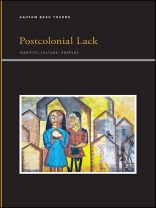Examines representations of surplus enjoyment in postcolonial literature and film to focus on self-other relations rather than difference.
Postcolonial Lack reconvenes dialogue between Lacanian psychoanalysis and postcolonial theory in order to expand the range of cultural analyses of the former and make the latter theoretically relevant to the demands of contemporary narratives of othering, exclusion, and cultural appropriation. Seeking to resolve the mutual suspicion between the disciplines, Gautam Basu Thakur draws out the connections existing between Lacan’s teachings on subjectivity and otherness and writings of postcolonial and decolonial theorists such as Gayatri Spivak, Frantz Fanon, and Homi Bhabha. By developing new readings of the marginalized other as radical impasse and pushing the envelope on neoliberal identity politics, the book moves postcolonial studies away from the perennial topic of identity and difference and into examining the form and function of the other as excess-surplus and/or lack-in colonial and postcolonial literature, film, and social discourse. Looking at writings by Mahasweta Devi, Amitav Ghosh, Leila Aboulela, Narayan Gangopadhyay, Katherine Boo, and films by Gillo Pontecorvo, Clint Eastwood, Ryan Coogler (Black Panther), and Tony Gatlif, Basu Thakur highlights a new set of ethical and political considerations emerging as a direct result of this shift and stakes a fundamental rethinking of postcoloniality through what he calls the ‘politics of ontological discordance.’
قائمة المحتويات
Acknowledgments
Introduction
postscript
1. The Subaltern Act of Freedom
2. Postcolonial. Animal. Limit.
3. Hysterization of Postcolonial Studies; or, Beyond Cross-Cultural Communication
4. Fictions of Katherine Boo’s Creative Non-Fiction, or, The Unbearable Alterity of the Other
5. Political Correctness Is Phallic: Idaho Politics, Black Panther, and Gran Torino
Conclusion: Particular Universal
Notes
Works Cited
Index
عن المؤلف
Gautam Basu Thakur is Associate Professor of English at Boise State University. He is the author of Postcolonial Theory and Avatar and coeditor (with Jonathan Michael Dickstein) of Lacan and the Nonhuman.












